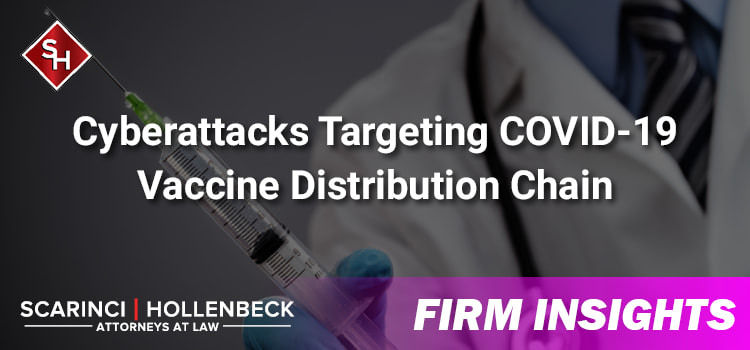Scarinci Hollenbeck, LLC
The Firm
201-896-4100 info@sh-law.comAuthor: Scarinci Hollenbeck, LLC|December 23, 2020
With the distribution of a COVID-19 vaccine already underway, the vaccine distribution chain is facing growing cyber risks. Hackers have already targeted the European Medicines Agency (EMA), which is akin to the U.S. Food and Drug Administration (FDA). According to Pfizer and BioNTech, documents related to its COVID-19 vaccine were “unlawfully accessed” in the EMA attack.
The COVID-19 vaccine distribution infrastructure in the United States has been attacked as well. According to U.S. Senator Gary Peters, a cold-chain storage company reported an attack last month.
In light of the increasing vaccine-related cyber threats, the IBM Security X-Force threat intelligence task force, the Federal Bureau of Investigation (FBI) and the Department of Homeland Security’s Cybersecurity and Infrastructure Security Agency (CISA) have all sounded the alarm.
In its report, IBM details a global phishing campaign targeting organizations associated with the COVID-19 cold chain, which is a component of the vaccine supply chain that ensures the safe preservation of vaccines in temperature-controlled environments during their storage and transportation. According to IBM, the perpetrators are impersonating a Chinese biomedical company called “Haier Biomedical” and sending phishing and spearphishing emails to executives and global organizations involved in vaccine storage and transport. As the report explains, “the established role that Haier Biomedical currently plays in vaccine transport, and their likely role in COVID-19 vaccine distribution, increases the probability the intended targets may engage with the inbound emails without questioning the sender’s authenticity.”
The phishing emails are posed as requests for quotations (RFQ) and contain malicious HTML attachments that open locally, prompting recipients to enter their credentials to view the file. IBM believes that the goal of the phishing campaign is to harvest credentials to gain future unauthorized access. “From there, the adversary could gain insight into internal communications, as well as the process, methods and plans to distribute a COVID-19 vaccine. This includes information regarding infrastructure that governments intend to use to distribute a vaccine to the vendors that will be supplying it,” the report states.
In its Cyber Alert, CISA encouraged Operation Warp Speed (OWS) organizations and organizations involved in vaccine storage and transport to review the IBM X-Force report. Meanwhile, IBM recommends that organizations take the following steps to increase their cyber readiness:
The global COVID-19 pandemic has created a wealth of opportunities for cyber criminals. We encourage all businesses, particularly those involved in COVID-19 vaccine development and distribution, to thoroughly review and test their existing cyber policies and procedures to identify any potential weaknesses. For compliance assistance, we recommend consulting with an experienced attorney.
If you have any questions or if you would like to discuss the matter further, please contact me, Maryam Meseha, or the Scarinci Hollenbeck attorney with whom you work, at 201-896-4100.
The Firm
201-896-4100 info@sh-law.com
With the distribution of a COVID-19 vaccine already underway, the vaccine distribution chain is facing growing cyber risks. Hackers have already targeted the European Medicines Agency (EMA), which is akin to the U.S. Food and Drug Administration (FDA). According to Pfizer and BioNTech, documents related to its COVID-19 vaccine were “unlawfully accessed” in the EMA attack.
The COVID-19 vaccine distribution infrastructure in the United States has been attacked as well. According to U.S. Senator Gary Peters, a cold-chain storage company reported an attack last month.
In light of the increasing vaccine-related cyber threats, the IBM Security X-Force threat intelligence task force, the Federal Bureau of Investigation (FBI) and the Department of Homeland Security’s Cybersecurity and Infrastructure Security Agency (CISA) have all sounded the alarm.
In its report, IBM details a global phishing campaign targeting organizations associated with the COVID-19 cold chain, which is a component of the vaccine supply chain that ensures the safe preservation of vaccines in temperature-controlled environments during their storage and transportation. According to IBM, the perpetrators are impersonating a Chinese biomedical company called “Haier Biomedical” and sending phishing and spearphishing emails to executives and global organizations involved in vaccine storage and transport. As the report explains, “the established role that Haier Biomedical currently plays in vaccine transport, and their likely role in COVID-19 vaccine distribution, increases the probability the intended targets may engage with the inbound emails without questioning the sender’s authenticity.”
The phishing emails are posed as requests for quotations (RFQ) and contain malicious HTML attachments that open locally, prompting recipients to enter their credentials to view the file. IBM believes that the goal of the phishing campaign is to harvest credentials to gain future unauthorized access. “From there, the adversary could gain insight into internal communications, as well as the process, methods and plans to distribute a COVID-19 vaccine. This includes information regarding infrastructure that governments intend to use to distribute a vaccine to the vendors that will be supplying it,” the report states.
In its Cyber Alert, CISA encouraged Operation Warp Speed (OWS) organizations and organizations involved in vaccine storage and transport to review the IBM X-Force report. Meanwhile, IBM recommends that organizations take the following steps to increase their cyber readiness:
The global COVID-19 pandemic has created a wealth of opportunities for cyber criminals. We encourage all businesses, particularly those involved in COVID-19 vaccine development and distribution, to thoroughly review and test their existing cyber policies and procedures to identify any potential weaknesses. For compliance assistance, we recommend consulting with an experienced attorney.
If you have any questions or if you would like to discuss the matter further, please contact me, Maryam Meseha, or the Scarinci Hollenbeck attorney with whom you work, at 201-896-4100.
No Aspect of the advertisement has been approved by the Supreme Court. Results may vary depending on your particular facts and legal circumstances.
Let`s get in touch!

Sign up to get the latest from the Scarinci Hollenbeck, LLC attorneys!